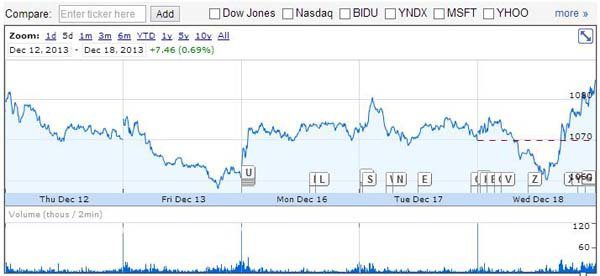Why is a search engine giant like Google (NASDAQ:GOOG) [stockdata ticker=”GOOG”] is interested in robotics? That’s the question everyone seems to be asking; after the news broke that Google has acquired one of the world’s leading robotics companies, Boston Dynamics.
Waltham, Massachusetts based Boston Dynamics has led the robotics industry for some years now. It builds advanced robots with remarkable behavioral attributes such as mobility, agility, dexterity, and speed. One of its four legged animal looking robots, the Cheetah, can run faster than the fastest human, at 29 miles per hour.
This acquisition is not as random as one might originally think, as Boston Dynamics is actually Google’s eighth acquisition of a robotics company during the last six months.
These robotics companies offer Google access to some pretty advanced sensor technology. According to Kevin O’Leary from O’Leary Funds, Google is buying companies that have developed advanced softwares to interact with sensors. “These robots are basically a bundle of sensors,” says Mr. O’Leary. Google has a lot of interest in robotics itself. Its driverless car project alone is enough to invest in world class robotics companies. Currently, Andy Rubin, who once led the development of Android, is in charge of Google’s robotics department, and he tweeted “The future is looking awesome!” regarding his latest acquisition. Mr. Rubin himself has confirmed that Google is interested in becoming a pioneer of sensor technology.
In the recent past Google has bought robotics companies in the United States and Japan that focused on sensor technology and the creation of software for advanced robotic maneuvers such as replicating the functions of the human arm, grasping technology, and computer vision etc.
While it was unclear how much Google paid for the deal, Google mentioned that it will continue Boston Dynamics’ current contract, worth US$ 10.8 million, to supply Defense Advanced Research Projects Agency (DARPA) with a type of robot that can come in handy during natural disasters and catastrophes where humans cannot operate safely. For example, during a nuclear disaster similar to the power plant meltdown in Fukushima, Japan.

Since the news broke on December 13, Google’s stock price [stockdata ticker=”GOOG”] gained US$ 25.02 per share representing a gain of 2.36 percent.
Asif Imtiaz worked as a prop trader for almost a decade, and later he managed trading operations for one of the largest foreign exchange strategy developers in Europe. Currently, he works as a trading consultant to several brokers and write on various tech and financial topics as a freelancer.
